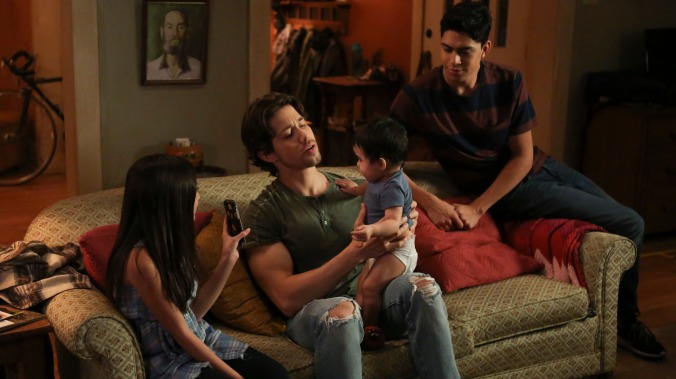Several key changes have been made to the framework: The Mexican-American Acosta family stands in for the Salingers, and the setting appears to have been moved from San Francisco to Los Angeles (at least, based on references to the proximity to U.S.-Mexico border). Lippman and Keyser, who co-wrote the first three episodes, also revise the tragedy that sets the series into motion—rather than lose their parents to a drunk driver, Emilio (Brandon Larracuente), Beto (Niko Guardado), Lucía (Emily Tosta), Valentina (Elle Paris Gelaspi), and Rafael (Lennox and Maverick Ashby) watch as Javier (Bruno Bichir) and Gloria Acosta (Fernanda Urrejola) are hauled off by ICE agents. This wrenching scene—set in the middle of family dinner, no less—comes just minutes into the pilot, and it’s not the only time we watch the Acosta family bid tearful goodbyes to each other. But it’s far from the last we see of Javier and Gloria; they’re still able (for now) to check in on their kids via Skype and phone calls.
However, that change doesn’t in any way diminish the trauma of being torn apart as a result of decisions made by people far removed from everyday life in this country; the family is beset by nightmares, resentment, money troubles, and, in the case of Emilio, fear of losing his DACA status. These complications generate consistent drama, but they also lend greater specificity and purpose to this retelling. Along with charming performances, purpose is what propels the pilot, which is otherwise a straightforward introduction. The new cast members are each given a chance to shine (albeit in regrettable circumstances), starting with Bichir and Urrejola, who bring passion and pathos to their roles. Larracuente provides a good, brooding anchor, while Guardado is the perfect combination of annoying younger sibling and nurturing older brother. Gelaspi is soulful but never an “old soul” cliché, but it’s Tosta who stands out in the early episodes. As the byzantine and counterintuitive nature of immigration policy and the path to citizenship reveals itself, Tosta gradually trades a more placid exterior for simmering resentment, without losing Luce’s multidimensionality. (The cachetón Rafa, played by infant twins, is kind of just there, because… he’s an infant.)
Lippman and Keyser, who co-wrote the premiere with Michael Zebede, draw the necessary parallels between their ’90s ensemble—including Gen X teen icons Scott Wolf, Neve Campbell, and Matthew Fox—and the new class. Emilio (or Milo, as he’s known to promoters and fellow musicians) is the hot, prodigal son with a fantastic head of hair and an aversion to commitment, who nonetheless finds himself in charge of a family and a restaurant. Precocious tween Valentina is a math nerd instead of a virtuoso violinist, but she feels her parents’ absence more than her sister or brothers. Like Bailey, Beto is the sensitive teen athlete who is also the linchpin; he struggles more visibly than anyone else to juggle school and family obligations. Lucía is highly intelligent like her Salinger counterpart, and is also eager to shed the good, obedient girl image she no longer relates to—but she’s far angrier than Julia or even any of the other Acosta kids.
It’s often through Lucía that Party Of Five voices the rightful frustration that immigrant families and Latinx families feel at being pawns in a political game. To do that properly and poignantly, there’s Latinx (and Hispanic) talent behind the scenes as well, including Zebede, a writer and co-executive producer, writer/producer Mary Angélica Molina, producer/director Rodrigo Garcia, and director Eva Vives. Along with Lippman and Keyser, this creative team crafts a tale still too rarely seen—that of people of color for whom assimilation and aspiration may not be enough—along with others that aren’t quite as specific, but just as relatable: those of love triangles and other romantic foibles; of wondering where you belong; of rebelling against a stifling status quo.
There’s a greater focus on teen angst and rites of passage in Party Of Five than overt social commentary, which can feel more groundbreaking and political than its real-life allusions. For the next 10 Wednesday nights, viewers will gather with a family that may or may not resemble their own, but is still relatable. The Acostas are caught up in a quagmire, but their lives mattered before zero-tolerance policy was implemented, and their lives will continue to matter as debates are held and changes made (or not). And as the season unfolds, the combination of this particular premise with this particular family becomes even more complementary, almost poetic. Brown kids (and Black and Indigenous kids) in this country are often made to grow up fast; they’re also, all too often, growing up in a world that doesn’t care as much about them. Headlines and tweets may make the Party Of Five reboot seem timely, but it’s actually a story that predates its source material.


 Keep scrolling for more great stories.
Keep scrolling for more great stories.
